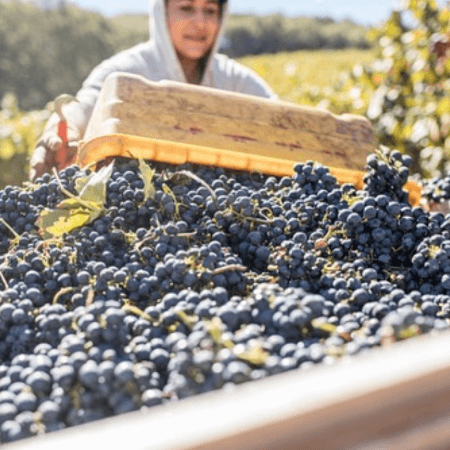The mention of sulfites in wine often stirs both curiosity and concern among wine drinkers. Many people have heard of sulfites, possibly in the context of dire warnings about headaches or allergic reactions. This leads many wary eyes to scrutinize wine labels in a quest for “sulfite-free” options. But what are sulfites, really? Do they deserve the negative hype?
Sulfites are compounds that naturally occur in many foods and drinks, including wine, as a natural byproduct of fermentation. Sulfites prevent oxidation and maintain freshness, so they are also often added by winemakers to preserve the wine they worked so hard to perfect. Sulfites and wine have long gone hand in hand, but despite their critical role in winemaking, sulfites are surrounded by myths and misconceptions, clouding the judgment of many wine lovers.
This blog post will unveil the mystery of sulfites in wine. We’ll dive deep into the role of sulfites, address common misconceptions, and discuss health aspects related to sulfites in wine. For those concerned about sulfite levels, we’ll also help you learn how to choose wines with fewer sulfites. Let’s get started on demystifying sulfites!
What Are Sulfites?
Sulfites, scientifically known as sulfur dioxide (SO2) and its derivatives, are compounds that play a crucial role both in nature and in the preservation of food and beverages. Sulfites are essentially substances that prevent oxidation and microbe growth, and act as preservatives that maintain freshness and extend shelf life.
In winemaking, sulfites are indispensable. Their primary role is to inhibit oxidation, a process where exposure to oxygen leads to a deterioration in aroma, flavor, and color: Oxidized wine turns a sort of brownish hue and can start to smell and taste like vinegar. Oxidation robs the wine of its vibrancy and complexity, turning a once lively and fruity wine into something dull and lifeless. Sulfites step in to protect the wine from this fate, ensuring that the flavors and aromas developed during fermentation are preserved from the barrel to the bottle and, finally, to your glass.
Sulfites also play a defensive role against unwanted bacteria and yeasts that can spoil wine. While the fermentation process is controlled, unwanted microbial activity can lead to off-flavors and spoilage. By adding sulfites, winemakers can control these microbial risks, ensuring that the wine retains its character. While sulfites play a crucial role in preserving wine, it’s also important to understand how wine can deteriorate over time. Discover more about the factors contributing to wine spoilage and how to store your bottles properly in our detailed article, ‘Can Wine Go Bad?’.
This may surprise some people, but all wine naturally contains sulfites. Yeast naturally produces sulfur dioxide during fermentation, meaning there is no such thing as a sulfite-free wine. Wines labeled as “no added sulfites” always contain SOME naturally occurring sulfites. This natural occurrence further underscores their integral role in wine, not just as an additive but as a component naturally intertwined with the winemaking process.
Understanding the role of sulfites in wine is the first step in appreciating their importance and dispelling the myths that surround them.
Misconceptions about Sulfites
One of the most pervasive myths about sulfites in wine is that they cause headaches and allergic reactions. This belief has led many to seek sulfite-free wines in the hope of avoiding the dreaded “wine headache.” However, scientific studies and evidence do not support sulfites as the main culprit for these unwanted side effects in most wine drinkers.
Sulfites do cause reactions in a small portion of the population, particularly those with asthma or a severe sulfite allergy. However, for the vast majority, sulfites are not the cause of wine-related headaches. Research suggests that other components or additives in wine, such as histamines or high tannic content, are more likely to be responsible for headaches in sensitive individuals. A wine’s alcohol content can also contribute to the likelihood of developing a headache. Another culprit is even more likely, and it has nothing to do with the wine itself: dehydration is an extremely common source of headaches, whether you’re drinking or not!
Regulatory bodies, including the U.S. Food and Drug Administration (FDA) and the European Union, have established safe limits for sulfite use in wines, recognizing their necessity while ensuring consumer safety. Studies have shown that sulfites at these regulated levels do not pose a health risk to the general population, debunking the myth that sulfites are inherently harmful when consumed in moderation.
Health Implications of Sulfites
Despite the general safety of sulfites, there is a small segment of the population that does experience sulfite sensitivity. It’s estimated that less than 1% of the general population is sulfite-sensitive, with a slightly higher prevalence among those with asthma, where sulfites can trigger an asthmatic response.
Symptoms of sulfite sensitivity can include wheezing, chest tightness, hives, and in rare cases, anaphylaxis. Given these potential reactions, it’s important for individuals who have experienced these or other symptoms to consult with a healthcare provider to accurately diagnose sulfite sensitivity.
For those diagnosed with a sulfite allergy or sensitivity, enjoying wine safely involves a few precautions. Opting for wines labeled as having “no added sulfites” can be a safer choice, although it’s crucial to remember that all wines contain some natural sulfites. Observing how different wines affect you and consulting with a healthcare provider for personalized advice are key steps to drinking wine safely for this impacted group of people.
Identifying Wines with Lower Sulfite Content
If you’re sensitive to sulfites or simply prefer wines made with minimal intervention, here are some tips to help you make informed choices.
- Read Labels Carefully. In most countries, the quantity of added sulfites is regulated, especially in organic wineries. For example: The USDA’s “made with organic grapes” certification allows a maximum of 100ppm of sulfites in wines made with organic grapes – that’s less than 1/3 the amount of sulfites conventional wines are allowed. The average total sulfites for Bonterra wines regularly fall below the regulated amount, averaging between 70 to 90ppm. While most wines will not disclose an exact sulfite level, wines marketed as “made with organic grapes” or “organically farmed” are legally required to have lower levels of sulfites than other wines.
- Understand Wine Regulations. Wine regulations vary by region, affecting sulfite levels. For instance, the European Union has stricter limits on sulfite levels, especially for organic wines, compared to the United States. Familiarizing yourself with these regulations can help you choose wines with lower sulfite levels.
- Opt for Organic, Biodynamic, or “natural” wines. Organic and Biodynamic wines are typically lower in sulfites because their certifications typically impose very low limit allowances on use of additional sulfites. Natural wines, while not legally defined, usually follow practices that minimize sulfite addition, since the focus is on letting the wine express its natural character. Natural and Biodynamic wines tend to have shorter shelf lives, so try to choose a recent vintage.
- Consider Winemaking Practices. Wines from vineyards that employ sustainable, organic farming practices tend to have lower sulfite additions. These winemakers often strive for a balance with nature, reducing the need for additional sulfites as a preservative.
The Role of Organic, Regenerative, and Sustainable Winemaking
- Organic and sustainable winemaking practices significantly influence the use of sulfites in wine. The movement towards organic, regenerative, and sustainable viticulture is driven by a philosophy of minimal intervention in both the vineyard and winery, which naturally leads to lower sulfite levels.
- Organic Certification and Sulfites: Organic certification, both in the United States and the European Union, restricts the use of synthetic sulfites, allowing only natural sulfites in significantly lower quantities than conventional wines. This results in wines that not only have fewer sulfites but also reflect a commitment to environmental stewardship and natural winemaking processes.
- Sustainable Practices: Sustainable winemaking goes beyond just sulfite use, encompassing water conservation, energy efficiency, and regenerative agriculture. This approach to minimizing chemical use directly affects sulfite levels. Sustainable winemakers often employ techniques that reduce the need for sulfites as preservatives, such as careful management of vineyard health, to ensure grapes are in optimal condition. This reduces the risk of disease and spoilage.
- Minimal Intervention: Both organic and sustainable winemaking philosophies emphasize minimal intervention. This means letting the natural processes dictate the winemaking as much as possible, with a focus on natural preservation methods. While organic wines may still contain sulfites, the levels are typically lower, and the overall approach aims to respect the wine’s natural character and integrity.
Enjoying Wine with Confidence
As you can see, sulfites in wine are essential compounds that ensure the preservation, stability, and quality of wine. Sulfites play a crucial role in maintaining wine’s freshness and preventing spoilage. For most wine drinkers, sulfites are safe and will not cause any unwanted side effects such as headaches. Wine is meant to be enjoyed and should not have to come with unwarranted health worries!
It’s important to recognize that while sulfite sensitivity does exist, it affects a very small percentage of the population. For those individuals, choosing wines with lower sulfite levels—such as organic or “natural” wines—can be a sensible approach. The world of wine is vast and varied, offering something for everyone. By exploring wines with an awareness of your own sensitivities, you can enjoy the wide array of tastes and experiences wine has to offer with confidence.
Diving deeper into the winemaking process and understanding how different practices affect wine composition, including sulfite levels, can enrich your wine experience. Knowledge about organic and sustainable winemaking practices not only informs your wine choices but also supports a more environmentally conscious approach to enjoying one of life’s oldest pleasures.
We encourage you to take your curiosity further by visiting local wineries and attending wine tastings that focus on low-sulfite and organic wine production or buy wine online, like the Bonterra wine set, to explore a variety of options from the comfort of your home. Such firsthand experiences offer invaluable insights into how wines are made and how different practices impact both the wine and the environment. Engaging directly with winemakers and tasting various types of wine can deepen your appreciation and allow you to make more informed choices aligned with your preferences and values. For enthusiasts looking to delve further into the world of red wines specifically, our detailed guide on types of red wine explores the nuances and rich tapestry of flavors that red varieties offer.
Wine is a journey—a complex interplay of science, art, and nature. By understanding the role of sulfites and embracing the diversity of winemaking practices, you’re equipped to navigate this journey with confidence and curiosity, whether you’re looking for red wines, white wines, or other varieties. Cheers to your wine discovery, exploring new horizons with every sip, and enjoying the rich tapestry of tastes wine has to offer, sulfites and all.
—
Join Bonterra’s Wine Club to enjoy quarterly club shipments of premium wines, including our acclaimed red wines (Bonterra Cabernet Sauvignon, Pinot Noir, Merlot, Zinfandel, and Red Blends and more) and our award-winning white wines (Bonterra Chardonnay, Sauvignon Blanc, Pinot Grigio/Pinot Gris, and more).










 TOP
TOP
